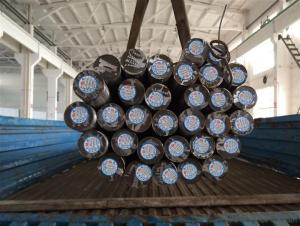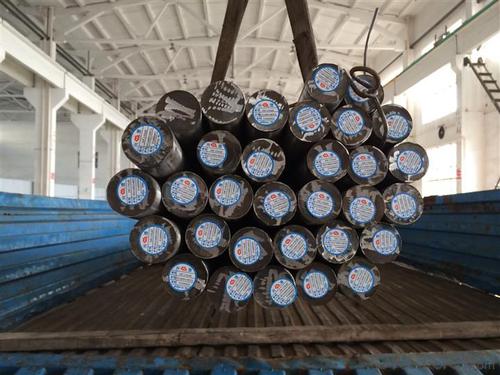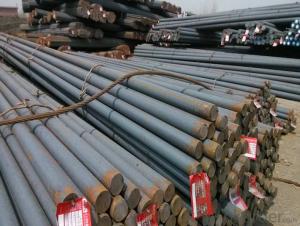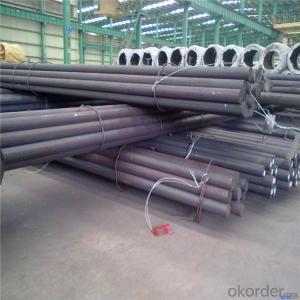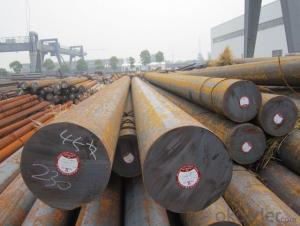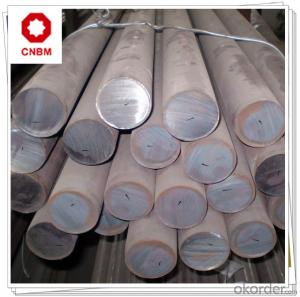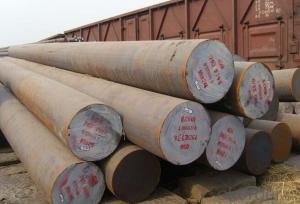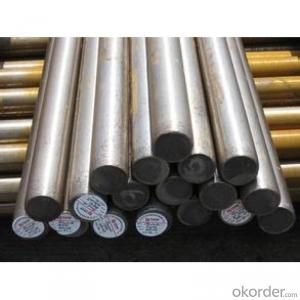Special Steel Carbon Steel Round Bar JIS S10C
- Loading Port:
- China main port
- Payment Terms:
- TT OR LC
- Min Order Qty:
- 30 m.t.
- Supply Capability:
- 10000 m.t./month
OKorder Service Pledge
OKorder Financial Service
You Might Also Like
Specification
Product Information
1 Grade Comparison:
GB | ASTM | JIS | DIN |
10# | SAE1010/AISI1010 | S10C | C10 (1.0214) |
2 Chemical Composition:
C | Si | Mn | P | S | Cr | Ni | Cu |
0.08-0.13 | 0.15-0.35 | 0.30-0.60 | ≤0.03 | ≤0.03 | ≤0.20 | ≤0.25 | ≤0.25 |
3 Brief Introduction:
Dimension | 13-350mm |
Length | 2-13m or as per your request |
Delivery condition | Hot rolled |
Heat Treatment | Normalizing, Annealing, Quenching |
Packing | Standard seaworthy packing or according to your requirements |
4 Mechanical Property:
Yield Strength (MPa) | ≥205 |
Tensile Strength (MPa) | ≥335 |
Elongation (%) | ≥31 |
Hardness (HB) | ≤137 |
Reduction in Area (%) | ≥55 |
Product Show
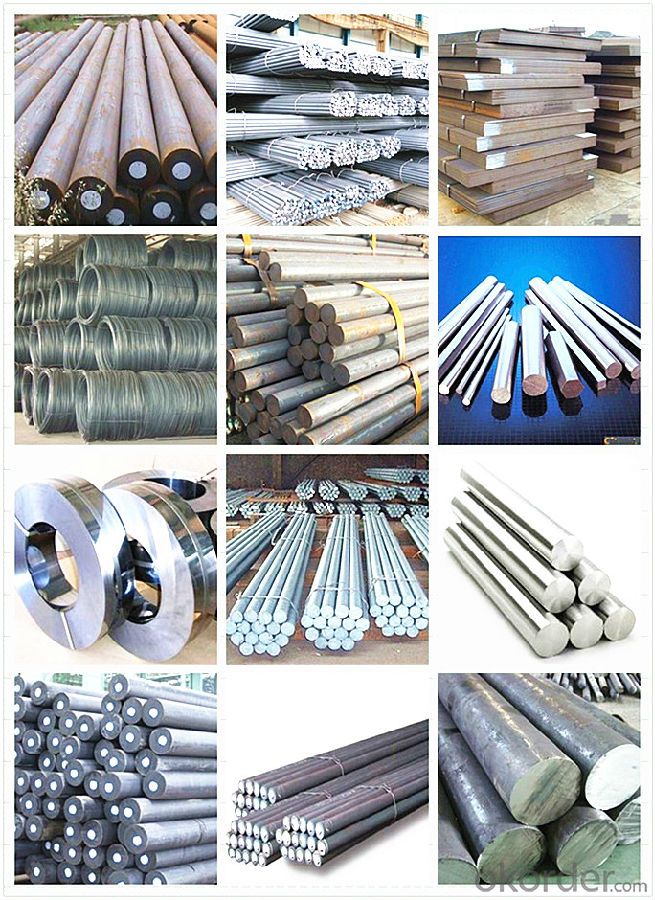
Workshop Show
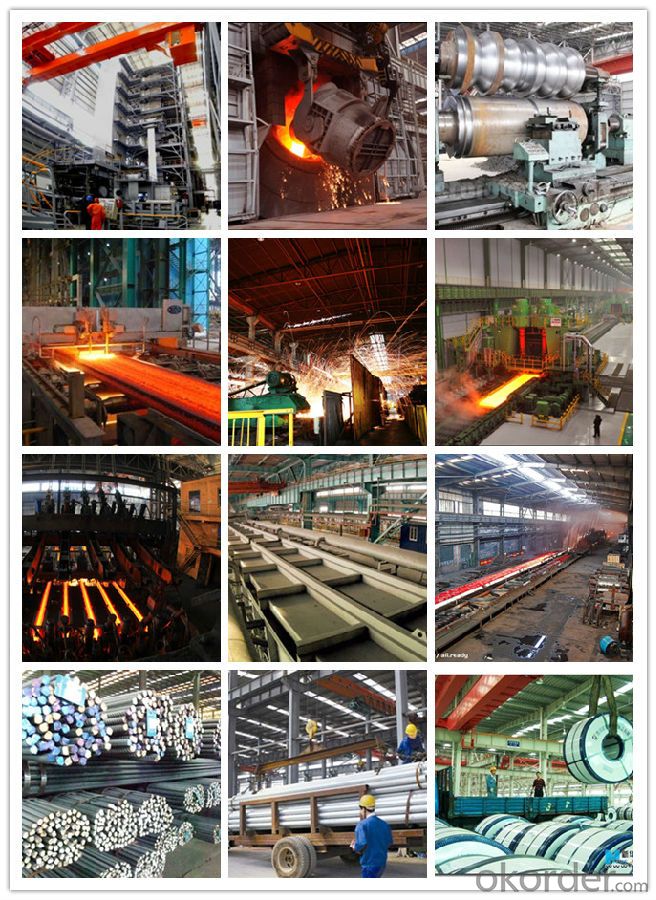
Shipping
1. FedEx/DHL/UPS/TNT for samples, Door-to-Door;
2. By Air or by Sea for batch goods, for FCL; Airport/ Port receiving;
3. Customers specifying freight forwarders or negotiable shipping methods!
Delivery Time: 3-7 days for samples; 5-25 days for batch goods.
Payment Terms
1.Payment: T/T, L/C, Western Union, MoneyGram,PayPal; 30% deposits; 70% balance before delivery.
2.MOQ: 1pcs
3.Warranty : 3 years
4.Package Informations: 1) EXPORT, In 20 feet (GW 25 ton) or 40 feet Container (GW 25 ton)
2)as customer's requirement
Why choose us?
(1) The leading exporter in China special steel industry.
(2) Large stocks for various sizes, fast delivery date.
(3) Good business relationship with China famous factories.
(4) More than 7 years steel exporting experience.
(5) Good after-sales service guarantee.
- Q: What are the key properties of special steel?
- Special steel has several key properties that set it apart from regular steel. These include high strength, excellent corrosion resistance, good wear resistance, and superior heat resistance. Special steel is also characterized by its ability to withstand extreme temperatures and pressure, making it suitable for critical applications in industries such as aerospace, automotive, and construction. Additionally, special steel can be easily machined and welded, allowing for greater versatility in manufacturing processes.
- Q: How does special steel contribute to the automotive racing industry?
- Special steel plays a crucial role in the automotive racing industry by providing high-performance components and ensuring the safety and reliability of race cars. Its unique properties such as strength, durability, and heat resistance make it ideal for various applications in racing vehicles. One of the main contributions of special steel to the automotive racing industry is its use in the construction of engine parts. Components like crankshafts, camshafts, connecting rods, and valves are subjected to extreme forces and temperatures during racing. Special steel alloys, such as high-strength steels, are specifically designed to withstand these conditions and offer superior performance compared to conventional steel. This allows race car engines to operate at higher speeds, generate more power, and endure intense racing conditions without compromising reliability. Furthermore, special steel is also extensively used in the manufacturing of suspension systems and chassis components. Racing cars are subjected to extreme loads and vibrations while cornering and maneuvering at high speeds. The use of high-strength steel in these critical components enhances the structural integrity of the vehicle, improving stability, handling, and overall performance. In addition to performance benefits, special steel also contributes to the safety of race cars. Safety is of paramount importance in the racing industry, and the use of special steel in roll cages and crash structures provides enhanced protection to drivers in case of accidents. Special steel alloys, such as boron steel, offer exceptional strength and energy absorption capabilities, minimizing the risk of injury during crashes. Moreover, the lightweight nature of special steel allows for the reduction of overall vehicle weight, leading to improved fuel efficiency and better handling. By using advanced steel materials and design techniques, race car manufacturers can achieve a balance between strength and weight, optimizing performance without compromising safety. In summary, special steel plays a vital role in the automotive racing industry by contributing to the performance, safety, and reliability of race cars. Its unique properties allow for the development of high-performance engine parts, suspension systems, and chassis components, enabling race cars to withstand extreme conditions and achieve superior performance on the track. Moreover, special steel enhances the safety of race cars by providing robust crash protection, while also offering weight reduction benefits for improved fuel efficiency and handling.
- Q: What are the specific requirements for special steel used in the nuclear fuel industry?
- The specific requirements for special steel used in the nuclear fuel industry are stringent and demanding. These requirements are necessary to ensure the safety and reliability of nuclear power plants. Here are some of the key specifications for special steel used in this industry: 1. High temperature resistance: Special steel used in the nuclear fuel industry must be able to withstand high temperatures without losing its structural integrity. This is crucial as nuclear reactors generate extreme heat during operation. 2. Corrosion resistance: Nuclear fuel environments can be highly corrosive due to the presence of hot and pressurized water, radiation, and chemical reactions. Special steel used in the industry must have exceptional corrosion resistance to prevent degradation and maintain safety. 3. Radiation resistance: The nuclear fuel industry involves exposure to radiation. Special steel needs to have excellent resistance to radiation damage and embrittlement to ensure long-term structural integrity and prevent any risk of failure. 4. High strength and toughness: Special steel used in the nuclear fuel industry should possess high strength and toughness to withstand the extreme conditions experienced within a nuclear reactor. This ensures that the steel can withstand the pressure and stress exerted on it during reactor operation. 5. Low neutron absorption: Neutron absorption is a critical factor in nuclear reactors. Special steel used in the industry should have low neutron absorption properties to prevent interference with the nuclear reactions and to maintain reactor efficiency. 6. Strict quality control and traceability: The manufacturing and fabrication of special steel for the nuclear fuel industry must adhere to stringent quality control procedures to ensure consistency and reliability. Traceability is also crucial to identify the origin and history of the steel, allowing for comprehensive inspections and assessments. Meeting these specific requirements is essential for the safe and efficient operation of nuclear power plants. Special steel used in the nuclear fuel industry must undergo rigorous testing, certification, and quality control processes to ensure its compliance with these stringent specifications.
- Q: How is high-speed stainless steel used in the production of machining tools?
- High-speed stainless steel is commonly used in the production of machining tools due to its excellent heat resistance, hardness, and corrosion resistance. This type of stainless steel can withstand high temperatures generated during machining operations without losing its strength. It helps in enhancing the tool's cutting performance, improving its lifespan, and reducing wear and tear. Additionally, high-speed stainless steel is also preferred for its ability to resist the corrosive effects of various chemicals and environments, making it suitable for a wide range of machining applications.
- Q: How does special steel perform in cryogenic strength?
- The excellent performance of special steel in cryogenic strength is well-known. Cryogenic strength refers to a material's capacity to endure extremely low temperatures while retaining its mechanical properties. Specifically engineered special steels, including stainless steels and nickel-based alloys, exhibit exceptional strength, toughness, and resistance to cracking at cryogenic temperatures. The special steel's distinctive composition and microstructure enable it to maintain its structural integrity and mechanical properties even under extremely cold conditions. These materials are designed to endure thermal stresses and brittleness that may occur at cryogenic temperatures, ensuring their reliability and performance in various applications. The critical importance of special steel's ability to excel in cryogenic strength is evident in industries such as aerospace, energy, and gas processing, where components are exposed to extremely low temperatures. For instance, the aerospace industry utilizes special steel in the construction of cryogenic fuel tanks and rocket engines, where it must withstand the extreme cold of space. Moreover, special steel's cryogenic strength proves advantageous in applications like liquefied natural gas (LNG) storage and transportation. The low temperatures involved in LNG processes necessitate materials that can endure thermal stresses while maintaining their strength and toughness. To summarize, special steel's unique composition and microstructure contribute to its exceptional performance in cryogenic strength. Its ability to endure extremely low temperatures without sacrificing mechanical properties makes it a reliable choice for applications in industries where cryogenic conditions are prevalent.
- Q: Is special steel suitable for electrical and electronic applications?
- Yes, special steel is suitable for electrical and electronic applications. Special steel is often used in electrical and electronic applications due to its excellent conductivity, high strength, and resistance to corrosion and wear. It is commonly utilized in the manufacturing of electrical connectors, circuit breakers, transformers, and various other components in the electrical and electronic industry.
- Q: How does special steel contribute to the defense and security industry?
- Special steel contributes to the defense and security industry by offering exceptional strength, durability, and resistance to extreme conditions. It is used in the production of various critical components such as armored vehicles, aircraft carriers, submarines, and ballistic protection systems. Special steel's unique properties enhance the performance and reliability of these defense systems, ensuring their effectiveness in safeguarding national security.
- Q: How is leaded steel used in machining operations?
- Leaded steel is commonly used in machining operations as it improves the machinability of the steel by reducing friction and cutting forces. The addition of lead in the steel composition allows for smoother and more efficient cutting, resulting in better surface finish and dimensional accuracy of machined parts.
- Q: What are the different renewable energy grades of special steel?
- There are several grades of special steel that are commonly used in the renewable energy industry. These grades are specifically designed to withstand the harsh conditions and requirements of renewable energy applications. One of the most common grades of special steel used in renewable energy is stainless steel. Stainless steel is known for its corrosion resistance properties, which make it ideal for offshore wind turbines or solar panel frames that are exposed to moisture and saltwater. It is also used in geothermal power plants, where high temperatures and corrosive environments are present. Another grade of special steel used in renewable energy is high-strength low-alloy (HSLA) steel. HSLA steel has a higher strength-to-weight ratio, making it suitable for applications that require lightweight structures with high strength, such as wind turbine towers or support structures for solar panels. Furthermore, there is advanced high-strength steel (AHSS) that is commonly used in the automotive industry but can also be utilized in renewable energy applications. AHSS offers excellent strength, durability, and impact resistance, making it suitable for components like blades or gears in wind turbines. Additionally, there is a grade of steel called weathering steel, which is often used in renewable energy applications that are exposed to outdoor elements. Weathering steel forms a protective layer of rust, which prevents further corrosion and eliminates the need for additional coatings. It is commonly used in solar panel support structures, transmission towers, or other outdoor equipment. Overall, the selection of the appropriate grade of special steel for a specific renewable energy application depends on factors such as the type of renewable energy source, the environment in which it will be installed, and the specific requirements of the project.
- Q: What are the properties of special steel?
- Special steel has several unique properties that set it apart from regular steel. First and foremost, it is known for its exceptional strength and durability. Special steel is often alloyed with other elements such as chromium, nickel, or molybdenum, which enhance its hardness and corrosion resistance. Additionally, this type of steel has high temperature resistance, making it suitable for applications that involve extreme heat or pressure. Special steel also exhibits excellent machinability, weldability, and formability, allowing for easy shaping and processing. Overall, its remarkable properties make special steel a preferred choice in industries such as automotive, aerospace, and construction.
Send your message to us
Special Steel Carbon Steel Round Bar JIS S10C
- Loading Port:
- China main port
- Payment Terms:
- TT OR LC
- Min Order Qty:
- 30 m.t.
- Supply Capability:
- 10000 m.t./month
OKorder Service Pledge
OKorder Financial Service
Similar products
Hot products
Hot Searches
Related keywords
